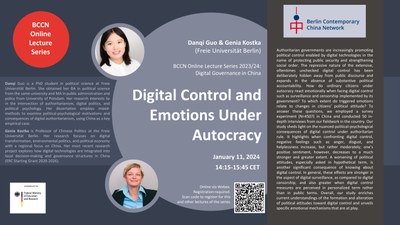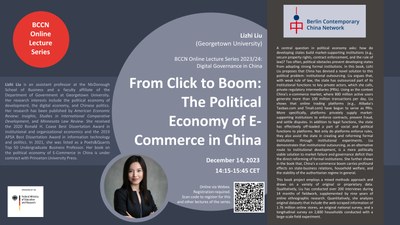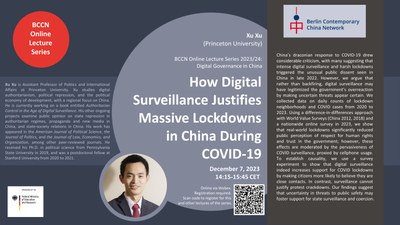Neuigkeiten
11.01.2024 BCCN Lecture:"Digital Control and Emotions Under Autocracy"
- https://www.iaaw.hu-berlin.de/de/ostasien/neuigkeiten/aktuelle-termine/11-01-2024-bccn-lecture-digital-control-and-emotions-under-autocracy
- 11.01.2024 BCCN Lecture:"Digital Control and Emotions Under Autocracy"
- 2024-01-11T14:15:00+01:00
- 2024-01-11T15:45:00+01:00
- Wann 11.01.2024 von 14:15 bis 15:45
- Wo Online
- Name des Kontakts Sarah Eaton
-
iCal
We cordially invite you to join lecture #4 of the BCCN Lecture Series "Digital Governance in China“:
Digital Control and Emotions Under Autocracy
By Danqi Guo and Genia Kostka (Freie Universität Berlin)
January 11, 2024, 14:15:15:45 CET
Please register here: https://fu-berlin.webex.com/webappng/sites/fu-berlin/webinar/webinarSeries/register/8df470e12e264f959533abfdd58bd646
Abstract
Authoritarian governments are increasingly promoting political control enabled by digital technologies in the name of protecting public security and strengthening social order. The repressive nature of the extensive, oftentimes unchecked digital control has been deliberately hidden away from public discourse and expands in the absence of substantive political accountability. How do ordinary citizens under autocracy react emotionally when facing digital control such as surveillance and censorship implemented by its government? To which extent do triggered emotions relate to changes in citizens’ political attitude? To answer these questions, we employed a survey experiment (N=4507) in China and conducted 50 in-depth interviews from our fieldwork in the country. Our study sheds light on the nuanced political-psychological consequences of digital control under authoritarian rule. It highlights when confronting digital control, negative feelings such as anger, disgust, and helplessness increase, but rather moderately; one’s positive sentiment, however, decreases to a much stronger and greater extent. A worsening of political attitudes, especially asked in hypothetical term, is another significant consequence of knowing about digital control. In general, these effects are stronger in the aspect of digital surveillance, as compared to digital censorship; and also greater when digital control measures are perceived in personalized term rather than in public terms. Overall, our study enriches current understandings of the formation and alteration of political attitudes toward digital control and unveils specific emotional mechanisms that are at play.
Bios
Danqi Guo is a PhD student in political science at Freie Universität Berlin. She obtained her BA in political science from the same university and MA in public administration and policy from University of Potsdam. Her research interests lie in the intersection of authoritarianism, digital politics, and political psychology. Her dissertation employs mixed-methods to examine political-psychological motivations and consequences of digital authoritarianism, using China as a key empirical case.
Genia Kostka is Professor of Chinese Politics at the Freie Universität Berlin. Her research focuses on digital transformation, environmental politics, and political economy with a regional focus on China. Her most recent research project explores how digital technologies are integrated into local decision-making and governance structures in China (ERC Starting Grant 2020-2026).
For more information of the overall lecture series please take a look at our Website.
Sincerely,
Your BCCN Team
13.12.2023 Buchpräsentation: Neuerscheinung Veit/Fuchs (Hg., 2024) "Eine gerechte Weltwirtschaftsordnung?"
- https://www.iaaw.hu-berlin.de/de/ostasien/neuigkeiten/aktuelle-termine/13-12-2023-buchpraesentation-neuerscheinung-veit-fuchs-hg-2024-eine-gerechte-weltwirtschaftsordnung
- 13.12.2023 Buchpräsentation: Neuerscheinung Veit/Fuchs (Hg., 2024) "Eine gerechte Weltwirtschaftsordnung?"
- 2023-12-13T18:30:00+01:00
- 2023-12-13T23:59:59+01:00
- Wann 13.12.2023 ab 18:30 Uhr
- Wo Aquarium (Südblock), Skalitzer Str. 6, 10999 Berlin
- Name des Kontakts Daniel Fuchs
-
iCal
Liebe Kolleg:innen, liebe Studierende,
ich freue mich, Sie auf den soeben publizierten Sammelband Eine gerechte Weltwirtschaftsordnung? Die »New International Economic Order« und die Zukunft der Süd-Nord-Beziehungen hinzuweisen und Sie zur Buchvorstellung am 13. Dezember 2023 in Berlin einzuladen.
Das Buch ist im Transcript-Verlag erschienen und dank Fördermittel auch als Open-Access-Publikation erhältlich: https://www.transcript-verlag.de/detail/index/sArticle/6630
Anlass des Bands ist das 50. Jubiläum der Beschlüsse der UN-Generalversammlung zur Schaffung einer "neuen Weltwirtschaftsordnung" oder "New International Economic Order" (NIEO). Die NIEO war die zentrale progressive Debatte der 1960er und 1970er zu einer Neuordnung der globalen Handels- und Wirtschaftsbeziehungen. Ziel war es, nach der politischen Entkolonisierung auch wirtschaftlich die kolonialen Strukturen zu überwinden und im globalen Süden eine gerechte Entwicklung zu ermöglichen. Neben vielen Wissenschaftler:innen, Politiker:innen und sozialen Bewegungen in Süd und Nord hat sich auch der ehemalige Bundeskanzler Willy Brandt damit befasst, und eine hochrangig und global besetzte Kommission zum Thema geleitet.
In unserem Band gehen wir der Frage nach, ob die damaligen Debatten und Beschlüsse auch für die gegenwärtige Neuordnung der Weltwirtschaftsstrukturen von Belang sind. Unsere Autor:innen diskutieren etwa die durch die Klimakrise notwendigen Ergänzungen und Erweiterungen der NIEO, und auch die Veränderung des globalen Südens durch die Industrialisierung in Ostasien. Weitere Themen sind Reparationen, technologische Standards, globale Gesundheits-, Nahrungsmittel-, und Rohstoffpolitik, die SDGs und fairer Handel.
Mit Beiträgen von: Ulrich Brand, Simone Claar, Caspar Dohmen, Klaus Dörre, Katja Freistein, Daniel Fuchs, Roy Karadag, Miriam Lang, Eric Otieno Sumba, Melanie Pichler, Mariam Salehi, Jenny Simon, Kressen Thyen, Alex Veit, Hannes Warnecke-Berger & Andreas Wulf
Buchvorstellung am 13. Dezember 2023 um 18:30 Uhr
Herzlich einladen möchte ich Sie auch zur Buchvorstellung am 13.12.2023 in Berlin.
Ort: Aquarium (Südblock), Skalitzer Str. 6, 10999 Berlin
Zeit: 13.12.2023, 18:30 Uhr
Mit: Alex Veit (Table.Media), Daniel Fuchs (HU Berlin) & Mariam Salehi (FU Berlin)
Moderation: Kai Koddenbrock (Bard College)
Eintritt frei
Herzliche Grüße,
Daniel Fuchs
-- Dr. Daniel Fuchs Wissenschaftlicher Mitarbeiter Institut für Asien- und Afrikawissenschaften Seminar für Ostasienstudien Humboldt-Universität zu Berlin Johannisstraße 10, 10117 Berlin T: +49 (0)30 2093 66920 M: dan.fuchs@hu-berlin.de H: https://hu.berlin/ostasienstudien
14.12.2023 BCCN Lecture:"From Click to Boom: The Political Economy of E-Commerce in China"
- https://www.iaaw.hu-berlin.de/de/ostasien/neuigkeiten/aktuelle-termine/14-12-2023-bccn-lecture
- 14.12.2023 BCCN Lecture:"From Click to Boom: The Political Economy of E-Commerce in China"
- 2023-12-14T14:15:00+01:00
- 2023-12-14T15:45:00+01:00
- Wann 14.12.2023 von 14:15 bis 15:45
- Wo Online
- Name des Kontakts Sarah Eaton
-
iCal
We cordially invite you to lecture #3 of the BCCN Lecture Series "Digital Governance in China“:
From Click to Boom: The Political Economy of E-Commerce in China
By Lizhi Liu (Georgetown University)
December 14, 2023, 14:15:15:45 CET
Please register here: https://fu-berlin.webex.com/webappng/sites/fu-berlin/webinar/webinarSeries/register/8df470e12e264f959533abfdd58bd646
Abstract
A central question in political economy asks: how do developing states build market-supporting institutions (e.g., secure property rights, contract enforcement, and the rule of law)? Too often, political obstacles prevent developing states from adopting strong formal institutions. In this book, Lizhi Liu proposes that China has devised a novel solution to this political problem: institutional outsourcing. Liu argues that, with weak rule of law, the state has outsourced part of its institutional functions to key private actors, which she calls, private regulatory intermediaries (PRIs). Using as the context China’s e-commerce market, where 800 million active users generate more than 100 million transactions per day, Liu shows that online trading platforms (e.g., Alibaba’s Taobao.com and Tmall.com) have begun to serve as PRIs. More specifically, platforms privately supply market-supporting institutions to enforce contracts, prevent fraud, and settle disputes. In addition to legal functions, the state has effectively off-loaded a part of social and political functions to platforms. Not only do platforms enforce rules, they also assist the state in creating and reforming formal institutions through institutional experiments. Liu demonstrates that institutional outsourcing, as an alternative route to institutional development, is a more politically viable solution to market failure and governance deficit than the direct reforming of formal institutions. She further shows in the book that, China's e-commerce boom carries profound effects on state-business relations, household welfare, and the stability of the authoritarian regime in general.
This book project employs a mixed methods approach and draws on a variety of original or proprietary data. Qualitatively, Liu has conducted over 200 interviews during 14 months of fieldwork, supplemented by nine years of online ethnographic research. Quantitatively, she analyzes original datasets that include the web-scraped information of 1.76 million online stores, an original national survey, and a longitudinal survey on 2,800 households conducted with a large-scale field experiment.
Bio
Lizhi Liu is an assistant professor at the McDonough School of Business and a faculty affiliate of the Department of Government at Georgetown University. Her research interests include the political economy of development, the digital economy, and Chinese politics. Her research has been published by American Economic Review: Insights, Studies in International Comparative Development, Minnesota Law Review. She received the 2020 Ronald H. Coase Best Dissertation Award in institutional and organizational economics and the 2019 APSA Best Dissertation Award in information technology and politics. In 2021, she was listed as a Poets&Quants Top 50 Undergraduate Business Professor. Her book on the political economy of E-commerce in China is under contract with Princeton University Pres
For more information of the overall lecture series please take a look at our Website.
Sincerely,
Your BCCN Team
ERC Consolidator Grant für Prof. Eaton und ihr Forschungsteam
Der Europäische Forschungsrat (European Research Council, ERC) hat aus 2.130 Bewerbern 308 Forscher:innen und ihre Teams für die diesjährigen Consolidator Grants ausgewählt. Darunter zwei HU-Forscher:innen.
Prof. Dr. Sarah Eaton, Professorin für Transregionale Chinastudien am Seminar für Ostasienstudien und ihr Forschungsteam erhalten für das Projekt TECHtonics annähernd zwei Millionen Euro.
TECHtonics
Für das Projekt TECHtonics untersucht Sarah Eaton auf theoretisch innovative und empirisch reichhaltige Weise die drei „aufstrebenden Mächte“ China, Indien und Kenia und ihre Aktivitäten auf dem Gebiet der globalen technischen Standardsetzung. Das Projekt wird zur Theoriebildung in den Disziplinen Internationale Beziehungen und Internationale Politische Ökonomie beitragen und speziell im Forschungsfeld der Dynamik von Machtübergängen zwischen etablierten und aufsteigenden Mächten.
Ein Ziel des Projekts ist die Entwicklung eines theoretischen Rahmens für die Untersuchung der Frage, wie und warum es einigen Entwicklungsländern trotz aller Widrigkeiten gelingt, Macht auf dem Gebiet der globalen Normung zu erlangen. Ein zweites Ziel ist die Entwicklung eines neuen Konzepts („governance rupture") zur Untersuchung der vielfältigen Formen der Anfechtung („contestation,“) in der internationalen technischen Normung. Da die Themen institutionalisierte Ungleichheit und komplexe Governance-Herausforderungen nicht nur in der technischen Standardsetzung, sondern auch für andere globale Politikfelder von Bedeutung sind, werden die Ergebnisse die Theoriebildung zu Macht, Politik und Anfechtung in der Global Governance-Literatur voranbringen.
Gratulationsschreiben der Senatorin für Wissenschaft, Gesundheit und Pflege Frau Dr. Ina Czyborra
Weitere Informationen
Pressemitteilung auf den zentralen Seiten der HU
Pressemitteilung des Europäischen Forschungsrats
Interview mit Prof. Eaton: „Bei technischen Standards zeigt sich im Kleinen, wie es zu großen geopolitischen Umbrüchen kommt“
07.12.2023 BCCN Lecture: "How Digital Surveillance Justifies Massive Lockdowns in China During COVID-19"
- https://www.iaaw.hu-berlin.de/de/ostasien/neuigkeiten/aktuelle-termine/07-12-2023-bccn-lecture-how-digital-surveillance-justifies-massive-lockdowns-in-china-during-covid-19
- 07.12.2023 BCCN Lecture: "How Digital Surveillance Justifies Massive Lockdowns in China During COVID-19"
- 2023-12-07T14:15:00+01:00
- 2023-12-07T15:45:00+01:00
- Wann 07.12.2023 von 14:15 bis 15:45
- Wo Online
- Name des Kontakts Sarah Eaton
-
iCal
You are cordially invited to participate in lecture #2 of the BCCN Lecture Series "Digital Governance in China“:
How Digital Surveillance Justifies Massive Lockdowns in China During COVID-19
By Xu Xu (Princeton University)
December 7, 2023, 14:15 -15:45 CET
Please register here: https://fu-berlin.webex.com/webappng/sites/fu-berlin/webinar/webinarSeries/register/8df470e12e264f959533abfdd58bd646
Abstract
China’s draconian response to COVID-19 drew considerable criticism, with many suggesting that intense digital surveillance and harsh lockdowns triggered the unusual public dissent seen in China in late 2022. However, this lecture argues that rather than backfiring, digital surveillance may have legitimized the government’s overreaction by making uncertain threats appear certain. The authors collected data on daily counts of lockdown neighborhoods and COVID cases from 2020 to 2023. Using a difference-in-differences approach with World Value Surveys (China 2012, 2018) and a nationwide online survey in 2023, they show that real-world lockdowns significantly reduced public perception of respect for human rights and trust in the government; however, these effects are moderated by the pervasiveness of COVID surveillance, proxied by cellphone usage. To establish causality, the authors use a survey experiment to show that digital surveillance indeed increases support for COVID lockdowns by making citizens more likely to believe they are close contacts. In contrast, surveillance cannot justify protest crackdowns. The findings suggest that uncertainty in threats to public safety may foster support for state surveillance and coercion.
Bio
Xu Xu is Assistant Professor of Politics and International Affairs at Princeton University. Xu studies digital authoritarianism, political repression, and the political economy of development, with a regional focus on China. He is currently working on a book entitled Authoritarian Control in the Age of Digital Surveillance. His other ongoing projects examine public opinion on state repression in authoritarian regimes, propaganda and new media in China, and state-society relations in China. His work has appeared in the American Journal of Political Science, the Journal of Politics, and the Journal of Law, Economics, and Organization, among other peer-reviewed journals. He received his Ph.D. in political science from Pennsylvania State University in 2019, and was a postdoctoral fellow at Stanford University from 2020 to 2021.
Sincerely,
Your BCCN Team






